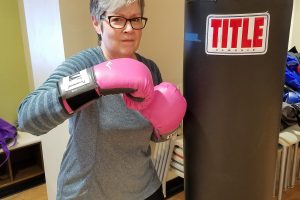Jayna Mullen is fighting her Parkinson’s disease in the boxing ring. She participates in Rock Steady Boxing, an innovative program that is gaining popularity among patients and doctors alike and now has more than 800 affiliate locations nationwide.
Three times a week, Jayna and others with Parkinson’s gather for one-hour classes in Lafayette, Indiana, and work on endurance and agility. Patients spend the first half hour walking, skipping, and jumping rope as well as performing step aerobics, isolated core exercises, and group games. The second half hour, the boxing gloves go on and the speed bags and punching bags come out.
“I’ve learned uppercuts and cross hooks,” Jayna says. “It’s fun, but it’s hard work.”
Even the moves between the different stations are intentional and used to practice balance.
“It’s all very practical but pushes your body,” Jayna says.
Parkinson’s impairs motor abilities
The cause of Parkinson’s remains unknown and the effects on individuals vary widely, but it is primarily a degenerative disorder of the nervous system that impairs the body’s motor abilities. In Jayna’s case, she began experiencing slowness of movement, a change in her gait, difficulty using her left side, diminished handwriting skills, and difficulty with anything that requires finesse with her hands.
“Sometimes when I’m standing at my kitchen counter and I just want to move to the right or to the left, my feet just kind of get stuck,” Jayna says. “You don’t realize how it affects your whole life. I feel like I’m living in someone else’s body. It’s not doing what it should.”
RSB forces the body to do what it doesn’t want to and that’s a good thing for Parkinson’s. It is believed that the program not only slows the progression of the disease but potentially heals damaged neural pathways. Both Samaritan Ministries member Jayna’s doctor and nurse practitioner are pro-RSB and encouraged by what they’re seeing in their patients.
RockySteadyBoxing.org’s blog features updates on the latest medical findings. Various studies support the idea that “rigorous exercise, emphasizing gross motor movement, balance, core strength, rhythm, and hand-eye coordination can favorably impact range of motion, flexibility, posture, gait, and activities of daily living.”
One of the classic symptoms of Parkinson’s is shuffling when walking, and, after just two weeks of RSB, Jayna’s doctor noticed a difference in her walk.
“As a Parkinson’s patient, you can easily get to where you’re shuffling along,” Jayna says. “When you’re doing this thing three times a week and it’s in you, you start to automatically adjust yourself.
“Other people struggle with drooling, problems swallowing, real movement issues where they could hardly step over something, and, now that they’re doing this, have had remarkable turnaround in their function,” Jayna says of some of the people in her class. “That’s the thing about Parkinson’s. It just diminishes your daily functions. Just propelling yourself into that strenuous situation physically really helps your day-to-day function. It definitely makes a difference.”
Jayna knows of a patient who started RSB as soon as he got his diagnosis in 2006, the same year the program was developed. Because he’s been practicing it, his disease is still at a level 1 out of 4.
“It’s an awesome class,” Jayna says. “I’m very thankful for it.”
Jayna quit her Parkinson’s medication
The standard Parkinson’s treatment protocol involves medications that relieve symptoms by replacing or mimicking neurotransmitters in the brain that are known to be involved in the disease. Though effective, Jayna’s doctor and nurse practitioner prefer that their patients don’t start medication too young because there are side effects. Eventually patients develop too much movement and tremors.
As soon as she was diagnosed in 2018, Jayna started the medication on a Friday. She quit taking it the following Monday and has stayed off it.
“I’m functioning right now,” Jayna says. “I’m able to do everything I could do. I just do it differently and slower. The exercise is helping. I prefer to not to put anymore in my body if I don’t have to, as long as I’m still functioning well.”
 It’s not just medication she’s trying to keep out of her system. She’s also more careful about how she eats. “Your diet is important,” Jayna says.
It’s not just medication she’s trying to keep out of her system. She’s also more careful about how she eats. “Your diet is important,” Jayna says.
She’s “cutting back on sugars and certain foods that nobody should be eating and that we’re all addicted to.”
You are what you eat, something she learned recently at a seminar that talked about the research on gut health. A Mayo Clinic Study shows that the incidence of Parkinson’s has increased dramatically since the 1970s, and some believe that processed foods in the typical American diet are the culprit.
“Some of it we can’t do anything about, but we can be mindful of what we put in our body,” Jayna says.
“The medication I find the most helpful is the Word of God,” she says. “I believe God will sustain me one way or another. In the meantime, I’m learning a lot. I’ve made new friends. You develop a lot more compassion when you’re dealing with something that limits your function. You don’t realize what you take for granted. It’s been a real eye-opening experience and something I never expected.”
Rock Steady Boxing was started in Indiana
Rock Steady Boxing was started in 2006 by former Marion County, Indiana, Prosecutor Scott C. Newman, who was diagnosed with the disease at age 40, and his friend, former Golden Gloves boxer Vince Perez. Together they designed a program that would attack Parkinson’s at its “vulnerable neurological points.” They quickly realized that what they’d discovered could help others, and they founded Rock Steady Boxing as a nonprofit venture.
Word of mouth spread, and Rock Steady Boxing classes have popped up all over the country to meet the fitness levels of patients at all stages of the disease. You can locate the one nearest you by typing your zipcode into the “Find A Class” tool at RockSteadyBoxing.org.
“People are hearing about it,” Jayna says. “Centers are opening everywhere. We’ve got people that drive an hour to come down to ours and some of them even farther, and it’s worth it.”
———————
This article is for educational purposes only and not meant as medical advice. Reposted with permission. For more information on Samaritan Ministries go here.



You must be logged in to post a comment.